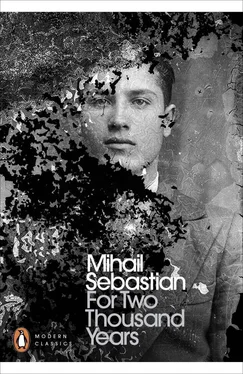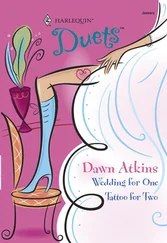The pleasure of being naked. Feeling yourself recovering your animal poise, to feel it concretely and bodily, hearing the sure surge of your blood, knowing the voluptuousness of lifting an arm and letting it fall, having a sure sense of your solitary physical life.
This should be inscribed in the eulogy of love.
*
A curious meeting with Ştefan D. Pârlea. It was he who stopped me. I wouldn’t have dared, though I retain a dram of affection for him since high school, without really knowing why.
A bony, hard, scowling fellow, with a mighty handshake, the eyes of a vulture, a virile ugliness that is almost a form of beauty.
‘Hey, look, the sun is shining …’
We wandered about together, through various neighbourhoods, finding it odd not to come across our old familiar Danube. He told me what was going on at Blidaru’s course, which he too discovered some time ago.
We talked a lot, about a thousand things, about books, memories, women. We stopped at a bakery, past the end of the bridge, to buy sesame pretzels. We ate in the street though people looked at us.
‘You know, Pârlea, we could be friends, if we weren’t divided by so much nonsense.’
‘No. You’re wrong. The pair of us can’t be friends. Not now or ever. Don’t you get the smell of the land off me?’
There was something absurd and terrible in his eyes.
Don’t you get the smell of the land off me? Yes, indeed I get it. And I envy you for it.
I have an immense longing for simplicity and unawareness. If I could rediscover some strong, simple feelings from somewhere centuries back — hunger, thirst, cold — if I could overcome two thousand years of Talmudism and melancholy, and recover — supposing one of my race has ever had it — the clear joy of life …
But happiness, for me, is a strange, tumultuous feeling, composed of endless evasions, always in danger of collapse.
I was happy three days ago. Today I’m depressed. What happened? Nothing. An inner crutch slipped. Some poorly suppressed memory rose to the surface.
At twenty years of age, healthy and without any personal handicaps, I feel that I have been destined to be divided in ten parts and negated in each of them.
No, we’re not an easy-going people. I am so ill at ease in my own company: how badly another person must feel being with me. We’re impulsive. We’re more than we can deal with. And on top of that, we’re impure.
We: meaning me. Ianchelevici Şapsă. Marcel Winder.
He smells of the land, lucky man.
I regret that, in this internal conflict, I retain some sympathy for myself. I’m sorry I catch myself loving my destiny. I’d like to hate myself, without excuses or forgiveness. I’d like to be an anti-Semite for five minutes. To feel an enemy in myself who must be vanquished.
*
The girl from a week ago came. I didn’t invite her in.
‘Didn’t you ask me to come?’
‘Yes. And now I’m asking you to leave.’
Something tells me that we are unable to live any of life’s moments fully. Not one of them. That we eternally stand at a remove from what is happening. A little above or a little below things, but never at their heart. That we don’t experience feelings or events fully, and then we drag these unresolved matters after ourselves. That we have never been complete villains or complete angels. That the fires we lit to offer up our hearts smouldered out too soon. That we have lived through an eternal compromise between fortune and misfortune.
*
It’s better this way, working fourteen hours a day. The exam is just an excuse. But I feel good in this prison of books, into which nothing penetrates from without or within.
I could have done with a dose of typhoid just now. Maybe this exam will be a substitute. The important thing is to forget myself, to have an exhausting, mechanical activity that absorbs me completely, and to hell with the world’s problems.
Marga Stern has paid a friendly visit to my garret. She was wearing a red dress, and her hand was warm and calm and she playfully placed it on my brow.
Not quite a seduction, dear girl.
*
Marcu Klein, you’re an ass, and if I had you in front of me I’d embrace you and then box your ears mightily four times so you wouldn’t forget.
You weren’t on your own. There were between forty to sixty of us with you, awaiting the civil law exam. From eight in the morning, from when we were called, until eleven in the evening, when Mormorocea, the professor, finally entered. He was clearly drunk and half asleep. We all saw it, just as you did, you smart-ass. We were all tired from that long, wasted day. But we took our places submissively, and perhaps a little disgusted. And you clenched your fists and continued frowning.
The professor mumbled a question and nodded off. The boy beside you answered clearly and very precisely. When he finished, there was a moment of silence. Mormorocea grunted, annoyed that the silence had disturbed his sleep.
‘You haven’t learned anything. Next one!’
You were ‘the next one’. You stood up. I closed my eyes, because I knew — do you hear? — I knew what was going to happen.
‘Professor, this is disgraceful.’
Why, Marcu Klein, could you not have kept quiet? Who pushed you, you lunatic, alone among forty, to speak for everybody, to condemn and avenge? What absurd need to denounce injustice inspires you to cry out? From what ancestral education in humiliation and revolt? What perverted instinct requires you to stop and investigate unpleasantness, instead of passing by? Do you not know how little it takes for people to turn against you? I’m furious with you because I can’t hate you enough and because I, along with you, belong to a race that can’t accept things and shut up.
*
Telegram to Mama: ‘Passed exams. Happy.’ Happy? I don’t know. All I know is that at home, on the right bank of the Danube, there are twenty metres of warm sand and, before me, an entire river to swim in.
November, the most beautiful month! Walking the streets, enveloped in a general lazy drizzle, shut off from the details around you, rendered impermeable, alone … You leave home with a pipe and your thoughts and walk the streets for hours, seeing nobody, stumbling into people, trees and shop windows, arriving home late, like a ship to port.
My time of the year, November. The month when I re-read books, leaf through papers, gather notes. It’s a kind of hunger for work, for activity, for taking up all the old tasks once again.
And that damp organic smell in the morning when I go out — and the warm halos of lamplight in the evening when I return …
*
In a bookshop, where I’d entered to browse the magazines.
Somebody slaps my back. I turn around. Ghiţă Blidaru.
‘You missed the opening lecture …’
I’m surprised, or very happy, or afraid of saying something impertinent. In any case, I say nothing.
‘Why don’t you pay me a visit? Look, Thursday evening, half past four, my place. What do you say?’
He bids me farewell with a comradely tip of the hat and leaves.
*
He has three rooms full of books and an empty fourth one where he sleeps: a simple bed, almost a camp-bed — and nothing else. On the wall by the door, a neat reproduction of a winter scene by Brueghel.
Almost half the front wall is taken up by an immense rectangular window made of a thick pane, more crystal than glass.
It’s a bare, stark, frugal interior, yet it has an inexplicable air of intimacy, even warmth.
I’m so intimidated I can hardly move. Behold this man, whom I loved and envied. He has become enveloped in so many layers of legend in the past year, since that first evening I heard him, above in the university.
Читать дальше












